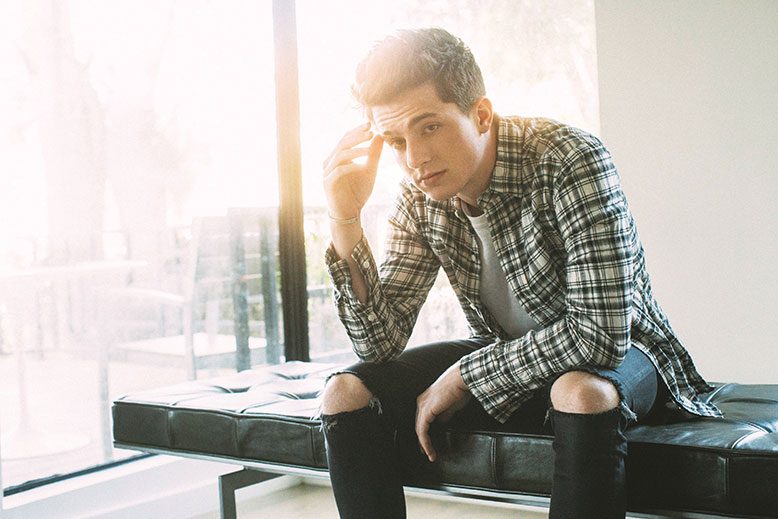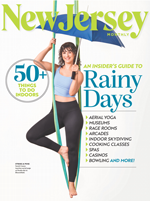
Charlie Puth had a really good 2015. First, there was the runaway success of “See You Again,” the 24-year-old Rumson native’s breakout single with rapper Wiz Khalifa. The hip-hop ballad charted at number 1 on the Billboard Hot 100 from April through July. Puth’s EP, Some Type of Love, came out in May. He starred in a Fiat Chrysler commercial and bought a new home in the Hollywood Hills. And in November, when Puth locked lips with pop star Meghan Trainor during their performance of his song “Marvin Gaye” at the American Music Awards, Twitter exploded with speculation about the couple. Puth quickly tamped down the rumors: “Before it begins….we are just friends,” he tweeted. A few weeks later, “See You Again” was nominated for three Grammy Awards, including Song of the Year.
With his ripped skinny jeans, James Dean haircut, effortless confidence at the piano and rare vocal range, Puth has captured the attention of teenyboppers—as well as musicians looking for the next hot producer. His debut album for Atlantic Records, Nine Track Mind, drops on January 29; Puth produced and cowrote all 12 tracks.
Charles Otto Puth is named after his father, a commercial and residential real estate broker. He grew up with his younger brother and sister, twins Stephen and Mikaela, in the family home overlooking the Shrewsbury River. When Puth was two, a friend’s black lab bit his face, leaving him with a scarred, jagged right eyebrow (a frequent topic in interviews).
His mother Debra, a music teacher, made sure to teach all three children to play the piano. Even before Charlie’s lessons began—when he was four—it was clear he was musically gifted. He was fascinated by sounds and loved getting toy instruments as gifts. “He would spend hours in his room, and you would hear noises all the time,” says Debra. (Over the years, Puth has accumulated numerous pianos. At one point, there was a piano or synthesizer in virtually every room of the Puths’ Rumson home.)
“It was obvious from the time he was five that he knew notes [by ear],” she recalls. Walking on the beach, little Charlie seemed to hear a symphony. “‘Mommy! The wind! It’s a B flat, nope, it’s a B,’” he would say. “‘Mommy, do you hear the water? It’s a D, no, a D sharp. Mommy, the wind with the water creates a chord.’”
Puth is a musical prodigy. He has perfect pitch: a rare auditory phenomenon that enables a person to identify and recreate a given musical note without a reference tone. He can play the songs of seagulls and footsteps in the Sea Bright sands, or an entire musical’s worth of tunes, without reading a single sheet.
At 10, Puth started jazz and improv piano lessons with Jim Josselyn at the School of Music and Drama in Little Silver (formerly in Fair Haven). Josselyn recorded music on a computer—much to his pupil’s amazement. “I saw him make little drum loops and play on top of those drum loops,” says Puth. “I fell in love with it. I think that’s what made me want to start producing music, watching him do rudimentary drum production on the computer.”
Later that year, Puth tried out for a youth jazz arts program at the Count Basie Theatre. Yvonne Lamb Scudiery, the education director at the Count Basie Performing Arts Academy, remembers the audition. Puth played “All the Things You Are,” a jazz standard with a challenging chord structure. He made it his own. “It was ridiculous what he could do,” recalls Scudiery. “He was the youngest that we auditioned…. He could improvise as a baby…. It blew us away.”
Clem DeRosa, a jazz drummer who was then the director of the program, put Puth in touch with some key figures on the local jazz scene. One was Gary Mazzaroppi, a bass player who has worked with Les Paul and Broadway trumpeter Joe Mosello, and is now an adjunct music professor at Brookdale Community College in Lincroft.
“When Gary came over,” says Puth, “we would just play jazz, and it was the best thing in the world. Afterwards we would all go out to dinner, and that’s like the best time in my life.”
Charlie figured out how to make money playing music at a young age. In sixth grade, he put together a holiday album, Have a Merry Charlie Christmas—complete with album art—and sold it door to door. (He donated his $600 profit to a local church.) “I used to go to country clubs and put out a cup and people would tip me and I would just play the piano impromptu,” he says. Frequently, Puth was the pianist of choice for local school plays and productions. The Count Basie theater hired him to play for a Charlie Brown production, spurring his first official W2 form.
“I’ve been obsessed with making money since I was at Driftwood,” Charlie says, referring to a beach club in Sea Bright where he spent his childhood summers. He’d sell seashells for quarters and trade Pokémon cards for dollars, and come back to his family’s cabana with a hundred bucks.
If he wasn’t making money, Puth was entertaining; ideally, he was doing both. At Rumson-Fair Haven Regional High School, he was known for beatboxing (making percussive vocal sounds). “When I was a freshman, all these pretty senior girls would come up to me and say, ‘Can you beatbox for me?’” he says. During his sophomore year of high school, the renowned Berklee College of Music in Boston offered Puth a full scholarship. While at Berklee, he posted a duet cover of Adele’s “Someone Like You” to YouTube with fellow student Emily Luther, leading to a record deal with Ellen DeGeneres, who seeks young talent for her Eleveneleven label.
Just after Puth signed the deal in Los Angeles, his family ran into Max Weinberg (the longtime Bruce Springsteen drummer, who Puth knew from playing piano for a local charity event) in the lobby of the Sheraton Universal Hotel. “He ended up giving me, my mom and my dad the best advice of our lives,” Puth remarks. “He said, ‘Never assume the first thing that you strike upon is going to be the end all; this is just a stepping stone.’ And you know, the Ellen thing didn’t work out. So I went back to school, took his advice, and something even better came of it.”
After graduating from Berklee, Puth moved to Los Angeles to start his music career. On his first day of songwriting on the West Coast, he wrote the R&B-inspired “Marvin Gaye,” which later became the hit duet with Meghan Trainor (the pair toured together this past summer). The lyrics pay homage to the legendary Motown singer/songwriter; the music evokes Ben E. King’s “Stand By Me” and “Every Breath You Take” by the Police. Most of all it shows Puth hitting the high notes as effortlessly as his soulful inspirations.
On his second day of songwriting, his publicist tipped him off that the Fast & Furious franchise was looking for an original song to play at the end of Furious 7 as a tribute to actor Paul Walker, who died in a November 2013 car accident. That day, he wrote and recorded the chorus and bridge for what would become the hit single “See You Again.” The song was selected from more than 100 submissions, and though other singers auditioned, Puth’s falsetto performance ultimately won over the Furious directors. The ballad—with its catchy verses and refrain from Wiz Khalifa—held number 1 on the Hot 100 for 12 non-consecutive weeks, tying Eminem’s 2002 hit “Lose Yourself” as the longest-running number-one rap hit in the chart’s history. “See You Again” is the first hip-hop music video to reach 1 billion views on YouTube. (The video has since surpassed 1.2 billion views.)
There was never a plan B for Charlie Puth. It was always music. Throughout our phone interview, he identified memories and locations by song: Van Morrison’s “Domino” plays in his head when he thinks of summers at the Shore. When Hurricane Sandy struck, he was at Berklee listening to “So What” by Miles Davis as his mother called from home, screaming, “We’re going to die!” (The Puth family did not evacuate during the hurricane; 12 boats from the Sea Bright marina ended up in their yard.)
Puth hopes Nine Track Mind will encourage young musicians that “they too can make an album in their bedroom.” But working hard can get lonely. His New Year’s resolution is “to get more comfortable in crowds. And maybe be a bit more social.”
So what will 2016 hold for Charlie Puth? “Hopefully writing more music for other artists,” he says. “And maybe try some acting!”

Your story sounds so much like my son. He too, learned to play piano by ear. He wows at the local school talent shows with his piano songs. Most say he has perfect pitch, but not sure how to confirm it.